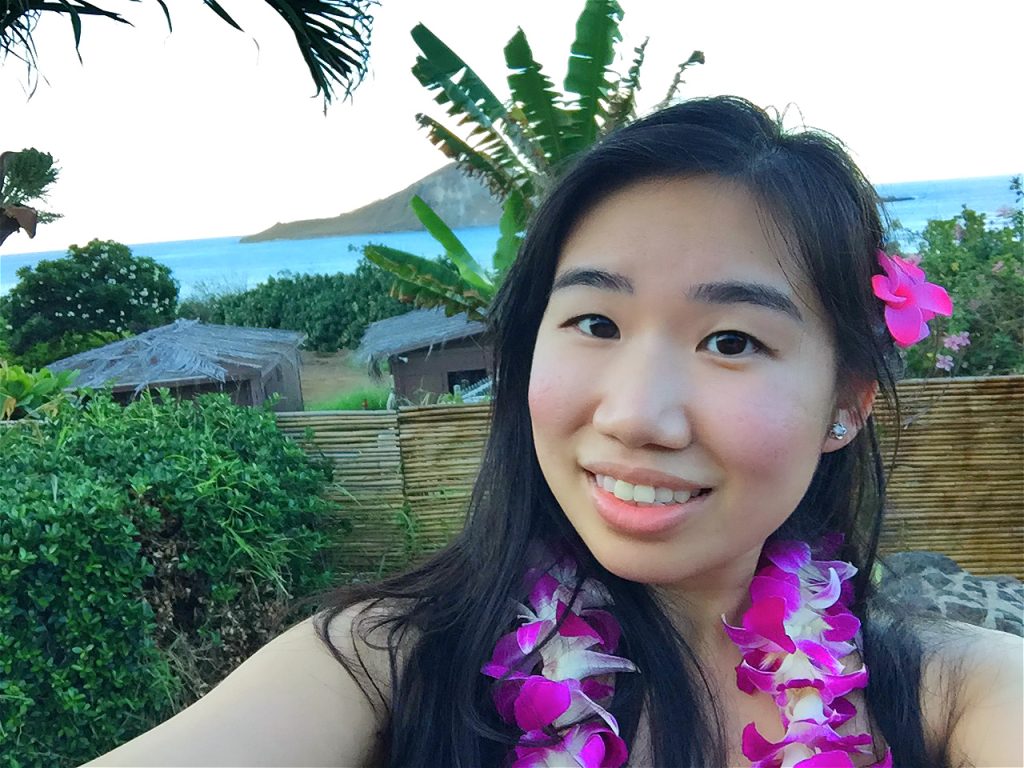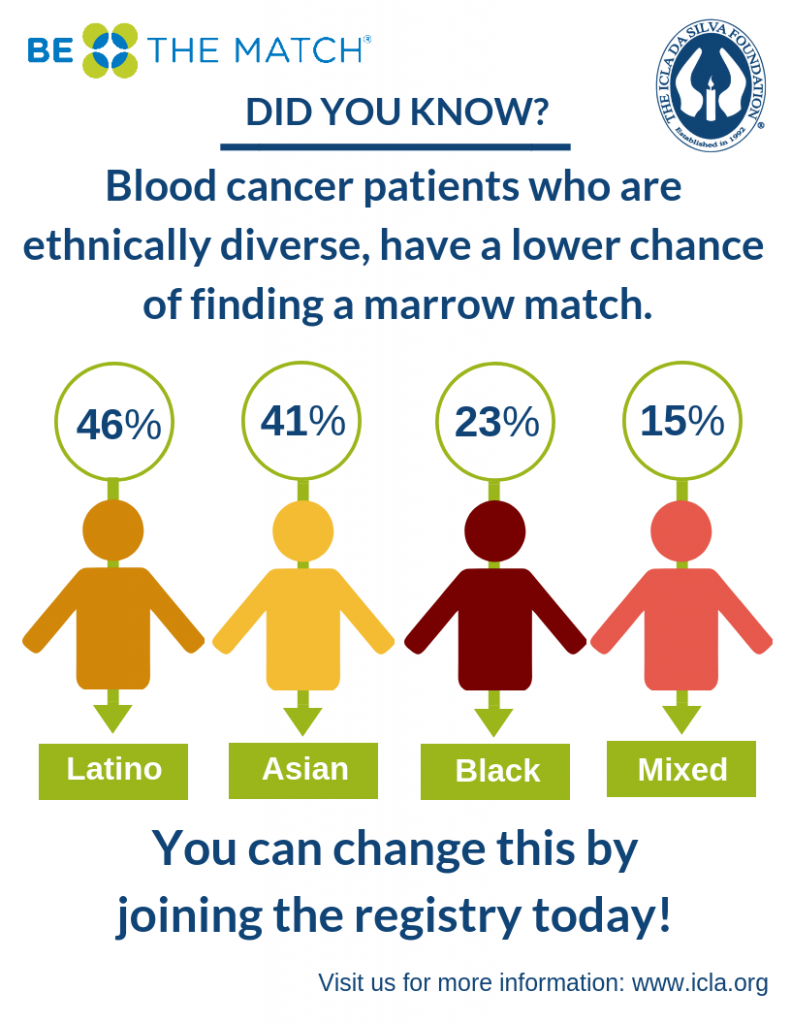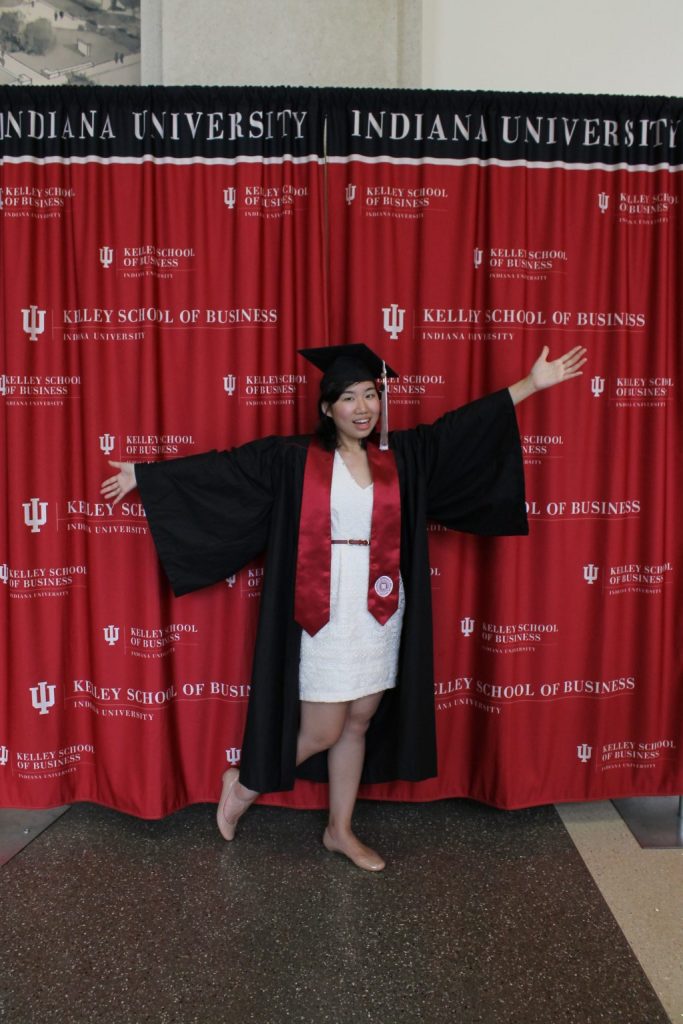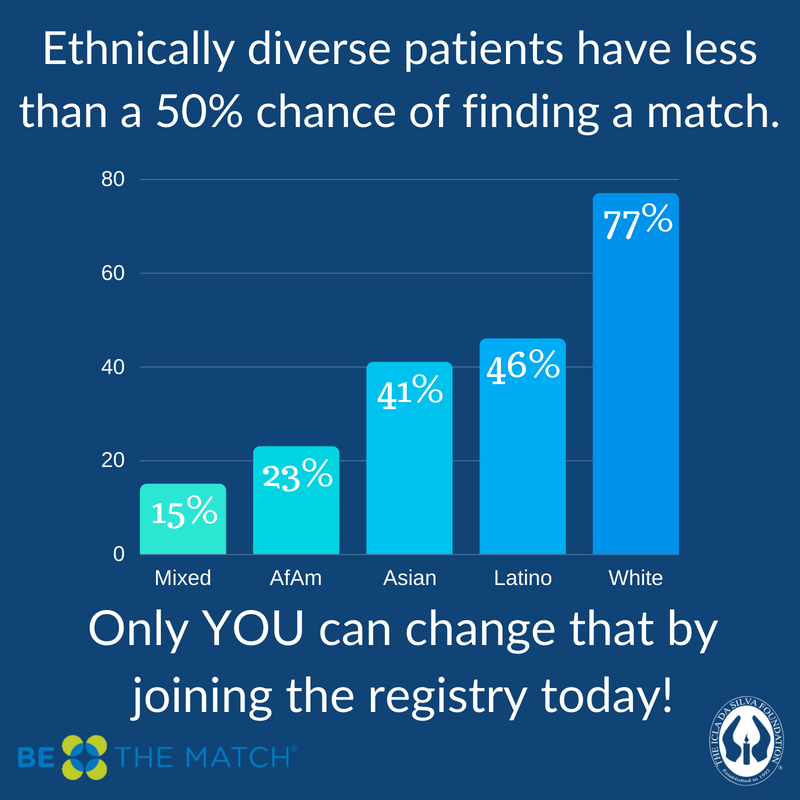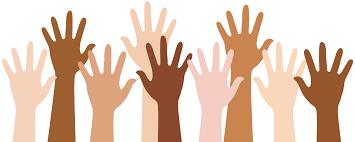Priscilla Lee seems to have a history of “twos”.
She is both intelligent, and funny. She spends time with her family in two vibrant cities, New York City and Hong Kong. She graduated from Indiana University after majoring in both Math and Economic Consulting. While at Indiana, she learned figure skating and broke her wrists, both of them, at the same time. Priscilla enjoys comedy, so she took improv lessons at both the Upright Citizens Brigade and, you guessed it, “Second” City. She performed improv, wait for it…twice.
Unfortunately, two times is not always better than once. Priscilla has also been diagnosed with leukemia, two times. She received one bone marrow transplant and is waiting for her second.
Diagnosed With Leukemia
She was first diagnosed with AML, acute myeloid leukemia, in December 2012, while on winter break with her family. For patients with AML, the bone marrow makes cells that have not completely matured, and the body is unable to ward off infections.
They found a matching bone marrow donor on the Be The Match registry and she received a transplant from an unrelated donor.
In May 2018, she relapsed and was also diagnosed with ALL, acute lymphocytic leukemia. Priscilla was immediately put under chemo, again. Her oncologist told her that the only way to remission is another bone marrow transplant.
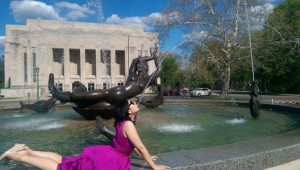 Priscilla was extremely fortunate to be able to find a matching donor, a second time. Although she is constantly smiling, she is obviously anxious, and her family and friends are concerned about her well being, while she prepares for her second bone marrow transplant.
Priscilla was extremely fortunate to be able to find a matching donor, a second time. Although she is constantly smiling, she is obviously anxious, and her family and friends are concerned about her well being, while she prepares for her second bone marrow transplant.
Challenges In Finding A Match
Priscilla is well aware of the difficulties that most ethnic minorities have when searching for a matching donor. Asians only have a 41% chance of finding a match, yet she was able to find a match, two times.
Since patients are most likely to match someone with the same ethnic ancestry, it is important for people with diverse ethnicity to include themselves on the registry. Many patients have very little chance of finding a matching donor.
Priscilla is both positive and strong. She is thankful for the selfless support of her parents, who still inspire her with their strength.
She is also incredibly grateful for the opportunity given to her by her donors, both of them. Two people have given her an opportunity for a second chance at life.
Her friends and family think Priscilla is brave, to be able to go through such adversity at a young age. Priscilla considers her bone marrow donor to be the truly brave soul. He had a choice. He chose to include himself on the Be The Match registry, and although he was under no obligation to agree to a donation when he was matched to Priscilla, he did. He donated and added years to her life. He became her superhero.
You can become someone’s superhero by joining the registry.
Giving Hope
Priscilla thinks it is important for those who are willing and able to join the registry to know exactly what they are giving. They are giving life, but they are also supplying hope. Not just to a patient in need, but to their entire family, as well as their extended network of friends. A person who joins the registry and agrees to donate will touch many people through their selfless act. We hope they inspire many more to do the same.
Joining the Registry
Anyone between the ages of 18-40 can join the Be The Match registry and give hope to the many patients searching for a matching donor. After clicking the link below, you set up an account with an email and password. You complete the online registration by answering some basic eligibility questions. You will receive a simple, do-it-yourself HLA typing kit in the mail. The kit includes everything you need to collect a sample of cells from your cheek, using 2 cotton swabs. Once you return the kit, you will be added to the registry. Hopefully, you will receive a call that you match a patient in need.
Only one in 430 people who register will match a patient and go on to make a donation.
Priscilla has another superhero waiting in the wings. Someone else who was brave enough to join the registry and agree to donate their stem cells to a complete stranger.
Her second fight has just begun, and it will continue. We appreciate that Priscilla is sharing her story, and we hope it will inspire more superheroes to join the registry on her behalf.
Please join the registry today, you will supply hope and opportunity to many patients, as well as their families and friends.
Make a difference, join the registry.
Written by: Bret Itskowitch
Searching for a Bone Marrow Donor – Guided by Angels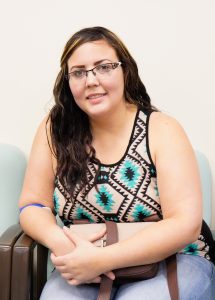 Life is a series of ups and downs. For some, it’s not an even balance, but we keep the faith and find a way to move forward. This is the story of Naileen Colon. Naileen faces many struggles, but she has faith in the guidance of her angels.
Life is a series of ups and downs. For some, it’s not an even balance, but we keep the faith and find a way to move forward. This is the story of Naileen Colon. Naileen faces many struggles, but she has faith in the guidance of her angels.
Diagnoses
Naileen grew up in Ponce, on the southern coast of Puerto Rico. At the age of nine, she was diagnosed with megaloblastic anemia, a condition in which the bone marrow fails to produce mature red blood cells. She maintained a healthy lifestyle to treat it. She lived a pretty normal, happy life for the next 15 years. She got married, had a baby and kept moving forward.
Unfortunately, in 2013, Naileen began to feel very weak. She was always tired and she was struggling with depression. After visiting her doctor, she was diagnosed with Chronic Lymphocytic Leukemia (CLL), a cancer of the blood and bone marrow.
Relapse
Unfortunately, it was barely more than a year when she had her first relapse. This began a downward spiral for Naileen.
She had to resign from her job, her husband left, and she moved back into her mother’s house with her son. Moving back home was a very difficult transition. Her son Onix is autistic, and requires a lot of attention. In addition, her mom was ill and constantly in and out of the hospital. Naileen struggled to find a balance between taking care of her son, her mother, and herself. She held onto her faith and remained confident that God would not leave her side. She was being guided by angels.
Her First Angel
In 2015, it was determined that her blood transfusions were not working as planned. Her cells were not reproducing. Naileen was advised that she would need a bone marrow transplant.
At this time, Naileen talks about meeting an ‘angel’, Elba Lebron. Elba is a community engagement representative from the Icla da Silva Foundation. Elba organizes donor drives and works closely with patients throughout Puerto Rico who are in search of a life saving bone marrow donation. Elba provided the support that Naileen needed to continue moving forward. With Elba’s help, they hosted numerous marrow drives in Puerto Rico. Naileen felt better about her diagnosis. She realized that she wasn’t alone. In raising awareness during the donor drives, she gained more hope. She focused on helping others. Even if she could not find a match for herself, she may be able to help others to find a match. That feeling gave her satisfaction. Her friendship with Elba was a major turning point in Naileen’s journey.
Her Second Angel
Naileen began a pill form of chemotherapy and was slowly restoring her health. She established a friendship with a man named Jerardo, who became her second angel. As time passed, they began dating and a romance quickly blossomed. “It felt like a blessing, I didn’t think anyone would want to deal with something like this. He is always there for me, helping me, and he is a great father to my son. My mom was happy to see things turn for me. We moved to Kissimmee, Florida in August 2016. We wanted a better quality of life, and access to more advanced treatment for myself and my son Onix.”
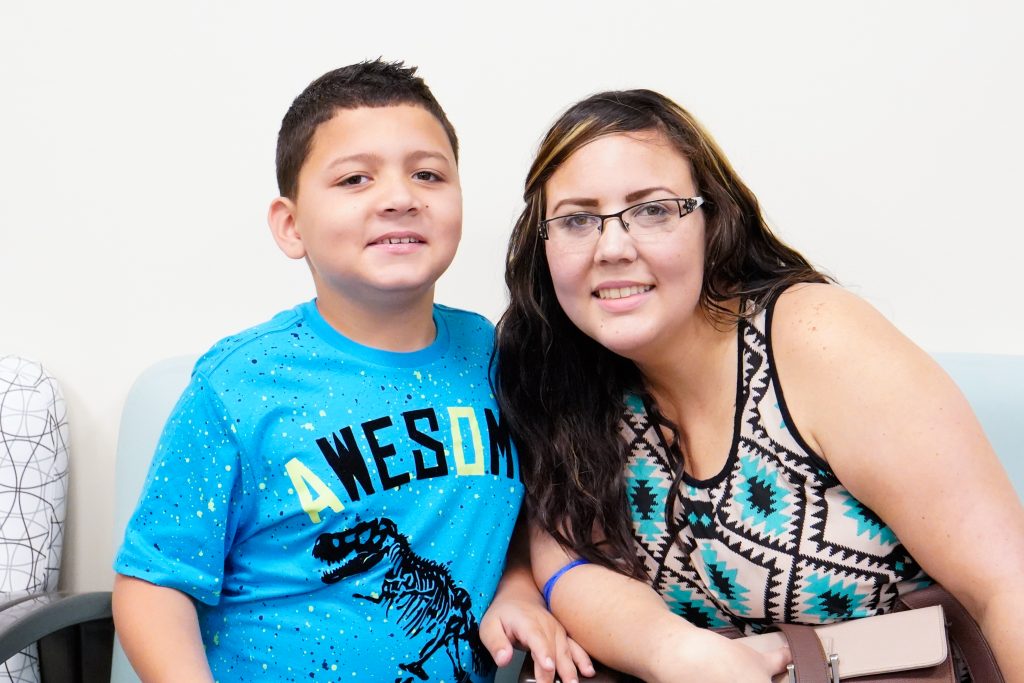 Moving Forward
Moving Forward
Naileen enjoys watching movies at home with Onix and Jerardo. She loves the beach, but because of her diagnosis and the risk of infection, she can’t visit as often as she would like. She loves being a mom, taking care of Onix and watching him progress in his everyday interactions with people. Watching him play makes her happy. Naileen has managed her challenges and is happy with her accomplishments so far, especially with her son, but she wants to do so much more. She understands that the ups and downs will continue, and although there are times when she questions what will happen next, Naileen knows that God’s plan is far more than what she can imagine. She puts all of her trust in him, and the guidance of her angels.
The Next Challenge
Naileen is in desperate need of a bone marrow transplant. The doctors have been searching the national registry for a matching donor for 3 years. Finding a matching bone marrow donor is not an easy feat, especially for patients with Hispanic or Latino heritage. There is currently no match for Naileen on the Be The Match bone marrow registry. The registry is the largest and most diverse in the world, but patients of Hispanic origin only have a 46% chance of finding a potential match.
The solution to this challenge is to get more people, especially those with diverse ethnic origins, to join the bone marrow registry. You can join online in less than 10 minutes, and agree to become a potential donor for patients like Naileen.
Please join the registry, for Naileen or the 14,000 other patients who are searching for their match.
You can also help by sharing Naileen’s story. As we increase awareness of the need for more potential donors, especially for people with diverse ethnicities, we hope that more people will understand the importance in joining the registry. The donation process is not difficult and there is no reason to be afraid. You can read more about it here: donation process
Thank you for reading Naileen’s story. We hope that her angels will help us guide more potential life-savers to join the bone marrow registry. It can start with you.
Surviving Cancer While Being Ethnically DiverseCelebrating Diversity
We live in a world that is becoming more ethnically diverse. This diversity makes every one of us richer in experience, knowledge, and understanding. Every day we observe different cultures, practices, foods, and religions. We recognize people for who they are, with different skin color, dress and speech.
We understand that diversity makes each one of us unique.
We celebrate it. We honor our heritage and our own ethnic background. We tell stories and share traditions with our sons and daughters, and we reflect on the uniqueness that makes us who we are.
The Challenge
For patients suffering from a blood cancer like leukemia, lymphoma or sickle cell, being ethnically diverse can challenge their survival.
70% of patients in need of a bone marrow or stem cell transplant, do not have a matching donor in their family. As a result, they rely on the NMDP registry, managed by Be The Match, to find a potential donor, a matching donor.
The best chance for a match is to find someone of similar ethnic ancestry who is willing to donate stem cells or bone marrow.
Unfortunately, many ethnicities are currently underrepresented on the registry, making it more difficult for those patients to find their match.
The Icla da Silva Foundation focuses on adding more ethnically diverse donors to the Be the Match registry. We strive to educate and inform more people about the importance of adding yourself to the registry and giving more hope to patients who are searching for a potential donor.
Answering The Challenge
There are 3 common questions regarding becoming a potential donor and giving a patient a second chance at life.
A. Is It Difficult?
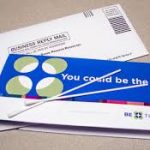 Joining the registry to be included in patient searches is easy. Click any of the links on this page, set up an account with email and password, and answer a few questions. A swab kit will be sent to your home. Once you swab the inside of your cheek and return it to Be the Match, you are entered into the registry and included in patient searches.
Joining the registry to be included in patient searches is easy. Click any of the links on this page, set up an account with email and password, and answer a few questions. A swab kit will be sent to your home. Once you swab the inside of your cheek and return it to Be the Match, you are entered into the registry and included in patient searches.
Everyone should do it.
The total registration process takes about 8 minutes…10 minutes if you type slow like me.
B. Is It Scary?
 There has been a lot of misinformation about bone marrow donation in movies and popular culture.
There has been a lot of misinformation about bone marrow donation in movies and popular culture.
None of it is true.
There are two ways to donate bone marrow, (1) the more common PBSC method, performed at an outpatient clinic, and (2) a donation performed surgically, at a hospital.
- 80% of donors make their donation through PBSC (stem cell donation), which is a non-invasive outpatient procedure. PBSC donors receive daily injections of a drug called filgrastim for five days, to increase the number of blood-forming cells in the bloodstream. Then, through a process called apheresis, a donor’s blood is removed through a needle in one arm and passed through a machine that separates out the blood-forming cells. The remaining blood is returned to the donor through the other arm.
- 20% of donors do so with a surgical procedure done under general or regional anesthesia in a hospital. While a donor receives anesthesia, doctors use needles to withdraw liquid marrow from the back of the pelvic bone.
C. Is It Expensive?
The cost to donate bone marrow or stem cells is 100% free and doesn’t utilize your insurance. Be the Match will make sure that you have everything you need to donate. Whether it’s a ride to a transplant center, a letter explaining your donation to your employer, or help with childcare, Be the Match will be there for you.
Consider A Simple Solution
Join the Registry
Everyone can become part of the solution by joining the Be The Match registry. Inform your family and friends about the importance of adding themselves to become potential donors. You may become a life saver to a patient in need, a patient who does not have a match.
What would you do if you were faced with the challenge of dealing with a blood cancer like leukemia or sickle cell? Where would you go to search for a matching donor? How would you find someone who shares a similar ethnic background to you? There are over 14,000 patients who currently need a matching donor. Many will not survive because they can’t find someone like them, someone like you.
Remember, ethnically diverse patients are not well represented on the registry. If you are ethnically diverse, you are the only one who can change this fact.
If you have already registered, thank you. There are other ways that you can help us add more diversity to the registry.
Host A Drive
Are you involved with a group or organization that is ethnically diverse? Join forces with us and host a donor drive at your school, work, or social organization.
We do all of the work, you just have to make the introductions.
Volunteer
You can also volunteer, and work with us to make our donor drives bigger, better and more inclusive.
The Donation Process
Do you still have questions about the donation process?
Please join the registry and give greater hope to patients in need, it’s their only chance for survival.
Remember, you may be someone’s cure.
Sign Up. Save a Life.
Written by Bret Itskowitch
Olga – Todavía Me NecesitanEllos Todavía La Necesitan
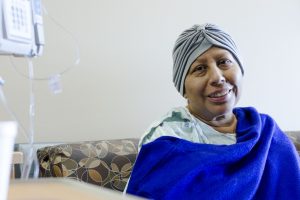 Olga está luchando contra el cáncer por segunda vez. Ella fue diagnosticada por primera vez con leucemia en el 2016, y entró en remisión. En 2018, luchó durante meses con cansancio, dolores de cabeza constantes y hematomas extraños. En marzo, le diagnosticaron AML, leucemia mieloide aguda. El AML es un cáncer de la sangre y la médula ósea y en general, empeora rápidamente si no se trata. Su mejor oportunidad de sobrevivir es un trasplante de médula ósea.
Olga está luchando contra el cáncer por segunda vez. Ella fue diagnosticada por primera vez con leucemia en el 2016, y entró en remisión. En 2018, luchó durante meses con cansancio, dolores de cabeza constantes y hematomas extraños. En marzo, le diagnosticaron AML, leucemia mieloide aguda. El AML es un cáncer de la sangre y la médula ósea y en general, empeora rápidamente si no se trata. Su mejor oportunidad de sobrevivir es un trasplante de médula ósea.
Olga es madre de tres hijos y abuela de dos nietos. Tiene 52 años. Su familia emigró hace 15 años de su pueblo pequeño, San Buenaventura, en Coahuila, México. Vinieron buscando un mejor tratamiento para su hija Betty, que padecía de una deficiencia crónica de crecimiento. Tomó 8 años para que Betty se recuperara y para entonces, habían formado una vida aquí.
Ella ha estado casada por 30 años. Su esposo, Jesús, trabaja en la construcción y es el sostén principal de la familia. “Trabajaba en la tienda de segunda mano de mi madre en México, pero desde que llegamos aquí me he quedado en casa para cuidar de los niños y la casa,” dijo ella. No poder cuidar de su hogar es lo que más le frustra a Olga de tener cáncer, ella siempre está cansada. La familia se mudó aquí hace 15 años para buscar ayuda para su hija y ahora las cosas han cambiado. Betty dejó su trabajo para cuidar a su madre a tiempo completo.
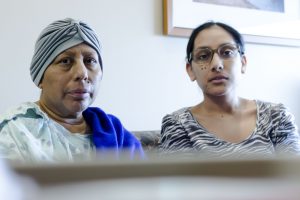 Una temperatura elevada y un recuento bajo de glóbulos blancos hacen que Olga regrese al hospital, con Betty a su lado día y noche. “No fue así la primera vez”, dijo Olga. “Siento que me dan de alta solamente para dar la vuelta y regresar”. Ha sido hospitalizada muchas veces desde que recibió su segundo diagnóstico en marzo del 2018.
Una temperatura elevada y un recuento bajo de glóbulos blancos hacen que Olga regrese al hospital, con Betty a su lado día y noche. “No fue así la primera vez”, dijo Olga. “Siento que me dan de alta solamente para dar la vuelta y regresar”. Ha sido hospitalizada muchas veces desde que recibió su segundo diagnóstico en marzo del 2018.
Olga no tiene seguro médico y le dijeron que las únicas opciones para el tratamiento eran el MD Anderson Center en Houston, o buscar asistencia médica en México. La historia de la familia con el sistema médico en México es lo que los llevó aquí en primer lugar. “Aquí trabajan contigo si no puedes pagar de inmediato“, dijo Betty. “En México, si no tienes el dinero por adelantado, no recibes tratamiento“.
Se Necesita Un Pueblo
La familia está agradecida por la ayuda que han estado recibiendo. Estaban agradecidos de encontrar un médico del Medical City Dallas Hospital en Dallas, Texas, que aceptó realizar el procedimiento una vez que se encuentra un donante compatible. La Fundación Icla da Silva está ayudando a la familia realizar pruebas de compatibilidad a los hermanos y hermanas de Olga tanto en los Estados Unidos como en México. Solamente alrededor del 30 por ciento de los pacientes encontrarán un donante compatible dentro de su familia. El otro 70 por ciento recurre al registro Be The Match para encontrar un donante compatible. La compatibilidad se basa en proteínas o marcadores de HLA (antígeno leucocitario humano) que se encuentran en casi todas las células del cuerpo. Ayudan al sistema inmune a identificar las células que pertenecen, y provocan las defensas del sistema inmune del cuerpo. Los tipos de HLA son heredados y personas de la misma ascendencia étnica suelen ser más compatible.
Desafortunadamente, las minorías están subrepresentadas en el registro, lo que hace que sea más difícil para esos pacientes encontrar un donante compatible. El equipo de Icla da Silva se enfoca en cambiar este desafortunado hecho y continuamos realizando campañas de donación de médula en todo el país en un intento de educar y agregar más diversidad al registro Be The Match.
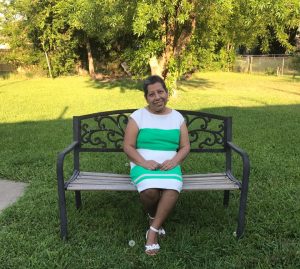 Olga tiene fe en que encontrará una donante compatible y ella se recuperará. Refiriéndose a su familia, “todavía me necesitan“, dice ella, “Dios me da fuerza“.
Olga tiene fe en que encontrará una donante compatible y ella se recuperará. Refiriéndose a su familia, “todavía me necesitan“, dice ella, “Dios me da fuerza“.
Únete al registro para ayudar a Olga u otro de los 14,000 pacientes que buscan un donante.
Olga’s Story – They Still Need Me
They Still Need Her
 Olga is battling cancer for the second time. She was first diagnosed with leukemia in 2016, and went into remission. In 2018, she struggled for months with chronic fatigue, constant headaches and strange bruising. In March, she was diagnosed with AML, acute myeloid leukemia. AML is a cancer of the blood and bone marrow and usually gets worse quickly if not treated. Her best chance of survival is a matching bone marrow transplant.
Olga is battling cancer for the second time. She was first diagnosed with leukemia in 2016, and went into remission. In 2018, she struggled for months with chronic fatigue, constant headaches and strange bruising. In March, she was diagnosed with AML, acute myeloid leukemia. AML is a cancer of the blood and bone marrow and usually gets worse quickly if not treated. Her best chance of survival is a matching bone marrow transplant.
Olga is a 52-year-old mother of three and grandmother of two. Her family emigrated to the Dallas area fifteen years ago from a small-town named San Buenaventura, in Coahuila, Mexico. They came seeking better treatment for their daughter Betty, who was suffering from a chronic growth deficiency. It took 8 years for Betty to recover and by then, they had formed a life here.
She has been married for 30 years. Her husband Jesus works in construction and is the primary breadwinner for the family. “I used to work at my mom’s second-hand store in Mexico, but since we got here I’ve stayed home to care for the children and the house,” she said. Not being able to care for their home is what frustrates Olga the most about having cancer, she is always tired. The family moved here 15 years ago to seek help for their daughter and now the tables have turned. Betty has quit her job in order to care for her mother full-time.
 An elevated temperature and low white blood cell count has Olga back in the hospital, with Betty at her bedside. “It wasn’t like this the first time,” said Olga. “I feel like they keep releasing me just so I can turn around and come right back.” She has been hospitalized many times since receiving her second diagnosis in March of 2018.
An elevated temperature and low white blood cell count has Olga back in the hospital, with Betty at her bedside. “It wasn’t like this the first time,” said Olga. “I feel like they keep releasing me just so I can turn around and come right back.” She has been hospitalized many times since receiving her second diagnosis in March of 2018.
Olga has no health insurance and they have been told that the only options for treatment were the MD Anderson Center in Houston, or to seek medical assistance in Mexico. The family’s history with the medical system in Mexico is what led them here in the first place. “Here they work with you if you can’t afford to pay right away,” she said. “In Mexico, if you don’t have the money upfront, you won’t receive treatment.”
It Takes A Village
The family is thankful of the help they have been receiving. They were grateful to find a doctor from Medical City Dallas Hospital in Dallas, Texas, who agreed to perform the procedure once a compatible donor is found. The Icla da Silva Foundation is helping the family by testing Olga’s brothers and sisters in both the United States and in Mexico. Only about 30 percent of patients will find a match within their family. The other 70 percent turn to the Be The Match registry to find a matching donor. Compatibility is based on HLA (human leukocyte antigen) proteins or markers found on almost all cells in the body. They help the immune system identify self-cells from non-self-cells, which trigger the bodies immune response. HLA types are inherited and finding a compatible match increases with people of the same ethnic ancestry.
Unfortunately, minorities are underrepresented on the registry, making it more difficult for those patients to find a matching donor. The Icla da Silva team is focused on changing this unfortunate fact and we continue to hold marrow drives throughout the country in an attempt to educate and add more diversity to the Be The Match registry.
 Olga has faith that a match will be found and she will recover. Referring to her family, “they still need me,” she says, “God gives me strength.”
Olga has faith that a match will be found and she will recover. Referring to her family, “they still need me,” she says, “God gives me strength.”
Please join the registry to help Olga or one of the other 14,000 patients searching for their match.
Saving Lives for 30+ Years
The Icla da Silva Foundation has been providing logistical, emotional, and financial support to patients with diseases like blood cancer and sickle cell for more than thirty years.
For patients scheduled to receive a bone marrow or cord blood transplant, we encourage you to fill out the Patient Registration Form and request an application for support.
For supporters, your donation will provide more patients with critical needs on their journey to receive a bone marrow transplant. Please consider a financial gift to support our life-saving mission.
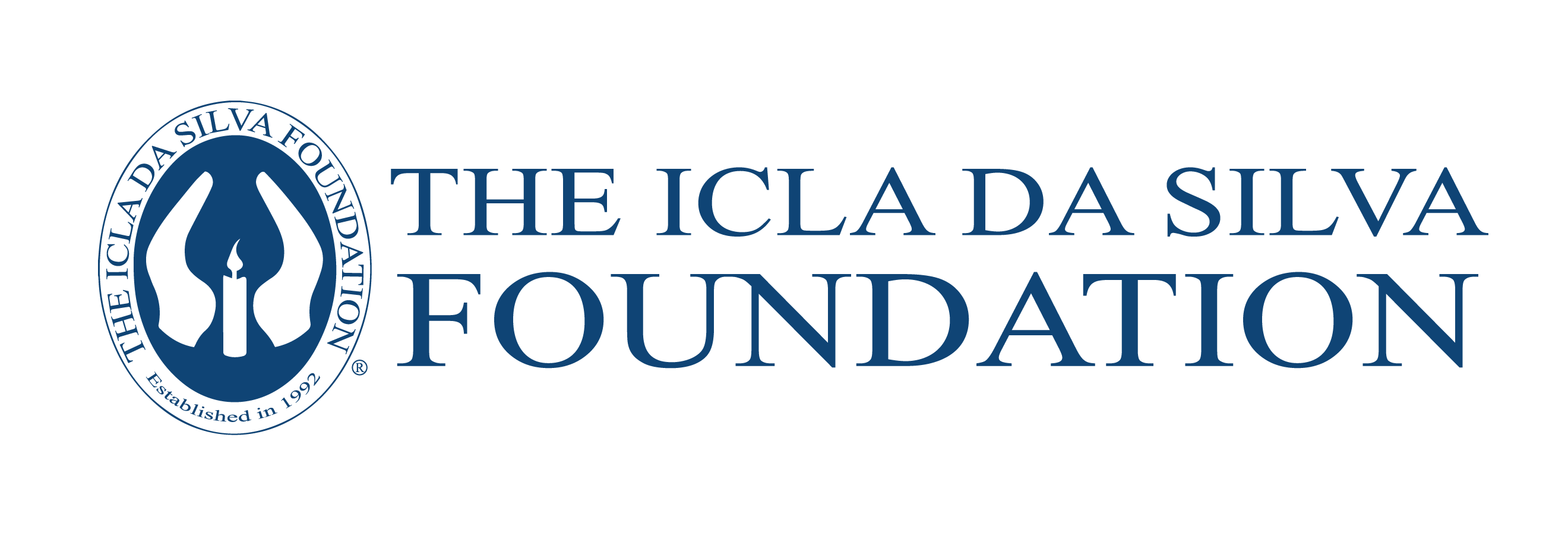
 English
English Spanish
Spanish Portuguese
Portuguese